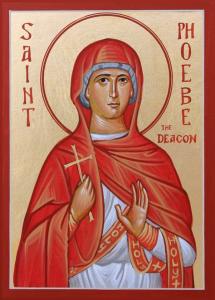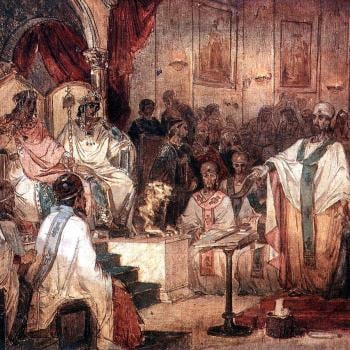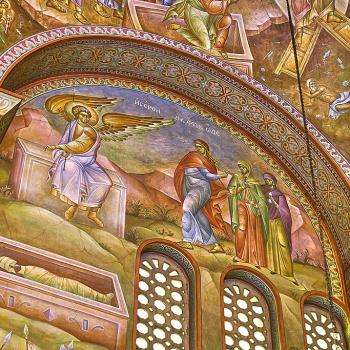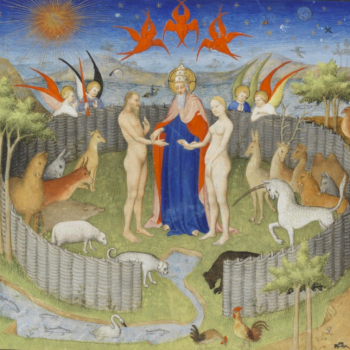
It is hard to imagine how different Christianity would have been without all the contributions women gave to the faith, especially when their contributions were respected and encouraged by various apostles like St. Paul. Yes, Jesus’ disciples showed confusion and misunderstanding concerning his relationship with women during his earthly ministry, but they seemed to have learned from it, and promoted the role of women in the church after Pentecost. This was one of the things which made Christianity quite different, as it was willing to challenge social status, and to affirm many of those who had otherwise been marginalized, like women; this is that it seems to have lost over time.
Among the many great women found in the first generations of the Christian faith is St. Phoebe, the deacon. We know only a little about her, yet we know that she was a great help to Paul and many others. Because of this, Paul made sure she received whatever help she needed for her own ministry: “I commend to you our sister Phoebe, a deaconess of the church at Cenchreae, that you may receive her in the Lord as befits the saints, and help her in whatever she may require from you, for she has been a helper of many and of myself as well” (Rom. 16:1-2 RSV). Even if the first deacons were male, the early church did not use that to deny the inclusion of women into the diaconate when more deacons were ordained. The order of deacons was established by the apostles, and they could, and did, develop it further beyond what was established when they chose the first seven deacons. This is why we can see in the New Testament that women could and did serve in that ministry.
The function and role of deacons has always been in flux, which is why we should not force deacons to be the same in every era. Nonetheless, one thing was clear, women were accepted as deacons, and this continued for generations, as can be seen in the way the Councils of Nicea and Chalcedon acknowledged that women were ordained as deacons, giving them the same status as men who were ordained as deacons. Yes, things changed from generation to generation as to what women deacons would do, but that did not discount their status, nor does it mean that they could not be granted other roles in the church. The church’s disciplines change to meet the people as to where they are at; today, the status of women in society should play a role in the church’s current disciplines, meaning, women deacons should not only be reintroduced, but also all the roles male deacons have in the church should be given to them as well.
If we examine history, we will see, it is not only secondary disciplines which have changed, but the way the church has developed its liturgical celebration of the sacraments have changed, as Vladimir Solovovy reminds us:
As for the sacraments, though they are the means of living intercourse between the Godhead and believers, especially at the more important moments of life, it was not to be expected that they should be as it were born full-grown in the Church. It is natural that in the early days some of them should not yet have the forms with which we are familiar and that their significance in the Church’s life should not be fully understood. But because mystical communion with the Godhead is less clearly expressed for a child than for an adult it does not follow that the adult should content himself with childlike forms, and it is only right and proper that the Church’s celebration of the sacraments should have become fuller and clearer as she herself grew and developed both within and without. [1]
We should not expect the sacraments, and the liturgical rites around them, to remain the same over time; everything changes, everything developments, and this is especially true in regards the performance of the sacraments. The thing of the sacrament, the grace of the sacrament, remains the same, but the ritual, the symbolic element of the sacrament which makes it a sacrament, changes over time. The way we understand symbols can and does change, showing how and why our symbols, the liturgical practices, will also change. Such development does not mean that the grace being offered has been changed. Whether or not the bread used in the eucharist is leavened or unleavened, whether confirmation (chrismation) happens immediately after baptism or later in time, the grace remains the same. And the grace given in the diaconate ordination, which is not the same thing (but it is related to) priestly ordination, a sacramental grace instead of a sacrament per se, remains the same whether the person who is a man, like St Stephen, or a woman, like St Phoebe. The church, in the development of its sacraments, and its sacramentals,continues to follow the commission it has been given, a commission given to it by God, a commission which guarantees grace will be given by the church. “But it is God who establishes us with you in Christ, and has commissioned us; he has put his seal upon us and given us his Spirit in our hearts as a guarantee” (2 Cor. 1:12-22 RSV). Grace is given to the church, and her ministers, not to lord it over others, rather, so that it and its leaders and will have what it needs to be proper service to the world. “Not that we lord it over your faith; we work with you for your joy, for you stand firm in your faith” (2 Cor. 1:24 RSV).
The church has been granted sacraments, not to give it absolute, tyrannical control of others and their lives, but rather, so it can continue the work of Christ in the world, serving the people and their needs. Who better represents this than deacons? The diaconate was founded to help the apostles serve the growing church. It should not be surprising as more and more women were brought into the church, many who were virgins that had never married, the church would see the prudence of having other women serve them, to help them deal with particular needs which men could not do as well. Nonetheless, it is also important to keep in mind that the unique charisms of women, whatever they are, should not be seen as being good only for other women, but as something which the whole church needs. Women should not find their work limited to what they can offer other women; they have much to offer men as well. This is why women deacons need not be, and should not be, limited in their functionality to serving only women. Arguments which try to suppress the work of women deacons today because of how they might have served the church in other times misunderstands discipline. Indeed, the work St Phoebe did with St Paul and the rest of the church shows they were not always so limited. Sadly, this was quickly forgotten, and eventually, even the good of women deacons was forgotten as they became a rare thing in the world. Once that happened, the voice of women itself quickly became silenced. Yes, there were always some exceptional women who had a voice, but they were exceptions to the rule – exceptions which were often used to silence all complaints about the lack of women’s voices being embraced by the church because when such a criticism was made, those women were brought up to suggest otherwise. How many men would like their voice limited to what a few exceptional men said through the centuries? Nonetheless, those exceptions, even if abused, showed the church that women did have something to contribute, and that their charisms could never be entirely snuffed out. Now that we see the problem for what it is, we can and should increase the voice of women in the church today. We can do this in many ways, including by recognizing what the apostles quickly recognized, that women not only could and should have roles like deacons in the church, those who are called to such roles should be helped and encouraged by everyone in the church. Until this is done, we should not be surprised that many women feel they are neglected by the church, and in that neglect, look elsewhere for a healthy spiritual life.
[1] Vladimir Solovyey, God, Man & The Church. The Spiritual Foundations Of Life. Trans. Donald Attwater (Cambridge: James Clarke & Co., 2016), 95.
Stay in touch! Like A Little Bit of Nothing on Facebook.
If you liked what you read, please consider sharing it with your friends and family!
N.B.: While I read comments to moderate them, I rarely respond to them. If I don’t respond to your comment directly, don’t assume I am unthankful for it. I appreciate it. But I want readers to feel free to ask questions, and hopefully, dialogue with each other. I have shared what I wanted to say, though some responses will get a brief reply by me, or, if I find it interesting and something I can engage fully, as the foundation for another post. I have had many posts inspired or improved upon thanks to my readers.













